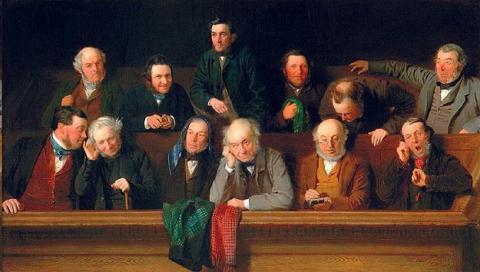In Praise of Jury Duty

From PunditWire.com:
Opinion
Every two years, regular as clockwork, I get a summons in my mailbox ordering me to report for jury duty. Every time it arrives, I groan.
Being summoned for jury duty is the closest I will ever get to being drafted into the army, and the two experiences are much alike. One is reduced to a number and ordered to report to an inconvenient location at an inconveniently early hour. One is searched, processed, relieved of sharp objects, confined to a holding room, indoctrinated and sworn.
And then one waits. And waits. And waits. Often with no apparent result.
On most of the occasions I’ve reported for jury duty, I’ve never seen the inside of a courtroom. This year, I actually got as far as the voir dire. In other words, the actual process of selecting a jury. It took nearly two hours, but in the end I was sent home.
The fact is that much of the time jurors are mere pawns in a game of chicken between opposing lawyers. Which side will cave first? In a criminal case, it’s a question of whether the prosecution or the defense will be the first to offer a plea bargain that the other can accept. In a civil case, it’s whether the plaintiff or the defendant will be the first to offer a settlement congenial to both.
Lawyers like negotiated agreements because they can control the process. If they go to trial—well, nobody can predict for certain what a jury will decide. And that, fellow citizens, is the whole point.
I still chuckle over a story about a jury in Australia that was called to hear the case of a man accused of stealing some cows. The jury returned this verdict: “Not guilty—provided that he returns the cows.”
The presiding judge was furious. He gave the jurors a pompous lecture to the effect that the dispensation of justice was his prerogative and that jurors were no more than mere finders of fact. He ordered them back to the jury room to reconsider.
Five minutes later, the jurors returned. Their verdict? “Not guilty. And he doesn’t have to return the cows.”
There’s a serious side to this story. The jury system keeps the law close to the people, and close to prevailing notions of justice. That in turn influences the way the law develops under our system of Common Law. In 18th Century England, for example, there were some 200 crimes that carried the death penalty—including poaching, forgery, shoplifting and picking a pocket of anything worth one shilling or more.
What brought about the end of this so-called “Bloody Code”? It wasn’t because the ruling classes suddenly developed tender consciences toward their social inferiors. It was because juries recognized that the death penalty was in many cases grotesquely disproportionate to the offense. So they would vote to acquit offenders rather than hang them. And this forced changes in the law.
In America, freedom of the press began with the case of the printer John Peter Zenger in 1733. Zenger was accused of libel because he published a weekly journal that contained articles critical of the royal governor of New York. In those days, English law held that criticism of the authorities—even if it was true—was libel, and the presiding judge directed the jury to find for the prosecution. Instead, twelve courageous jurors, recognizing that what was at stake was the right to speak the truth to power, defied the judge and voted to acquit.
Later, in the years leading up to the Civil War, Congress passed the Fugitive Slave Act, requiring that runaway slaves captured in anti-slavery states be returned to their Southern masters. The effect of this law was blunted because Northern juries would frequently acquit persons accused of assisting slaves to escape.
Even today, the possibility of jury nullification still exists. Some advocates of drug legalization see it as a way to end prosecution for nonviolent drug offenses and, ultimately, to force the repeal of laws against the use of recreational drugs.
The right of trial by jury goes back to the year 1215 and a pleasant English meadow called Runnymede, where a group of discontented English barons forced King John to sign the Magna Carta. Prior to that great event, King John liked to boast, “The law is in my mouth.” Magna Carta zipped his lip. From that time on, the growth of the Common Law gradually curbed the exercise arbitrary power. And trial by jury was an important part of that process.
By a happy coincidence, Houston’s Museum of Natural Science is currently exhibiting a rare copy of the Magna Carta, on loan from Hereford Cathedral in England. So, a few days before I reported for jury duty, I took an afternoon off to view the document myself and see in the original Latin the words that translate, “No Freeman shall be taken or imprisoned … but by lawful judgment of his Peers, or by the Law of the land.”
At that moment, I could feel without flattering myself that I was part of a struggle for freedom and justice that goes back nearly 800 years and is still going on to this day. Because this struggle is never wholly won; freedom and justice are never entirely secure. And that’s why juries matter.
So, two years from now, when that summons for jury duty shows up once again, regular as clockwork in my mailbox, I’ll grumble—but I’ll go.
Author Bio:
Gordon, who wrote speeches for the Reagan White House and Gen. Colin Powell, is currently a freelance speechwriter in Houston. Web site: www.ringingwords.com.




























































































































































































































































































































